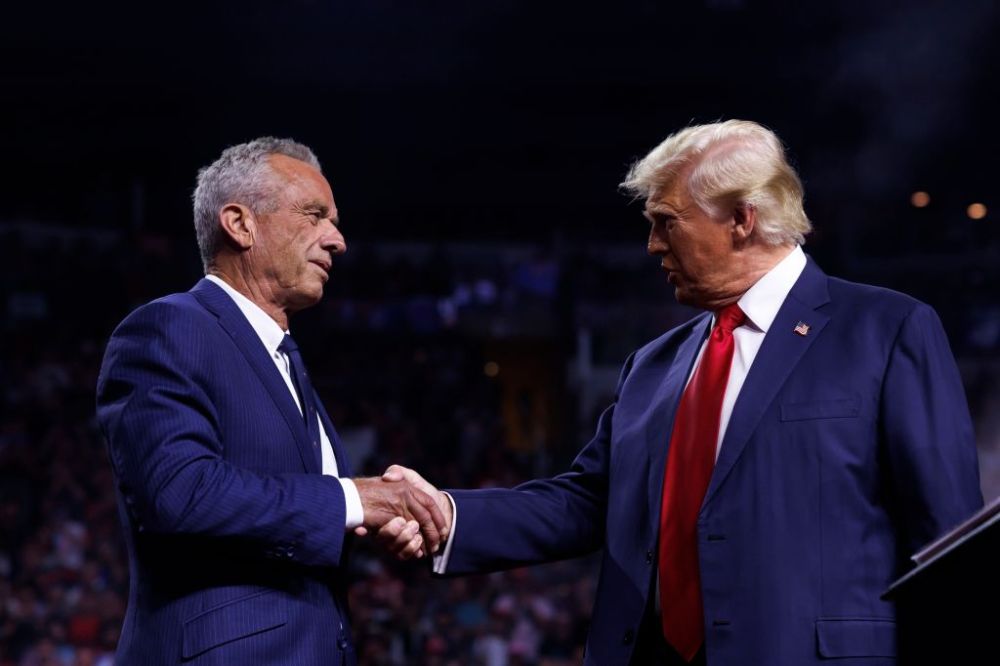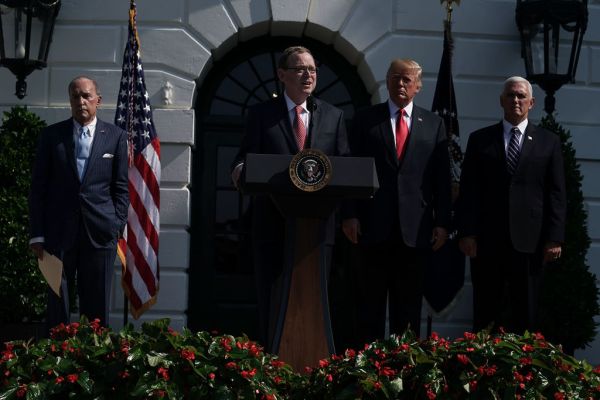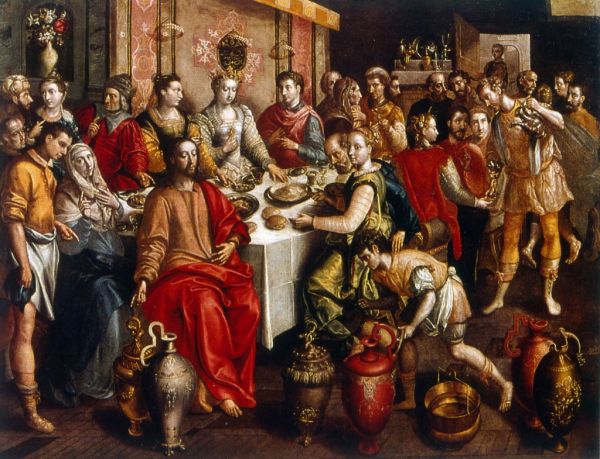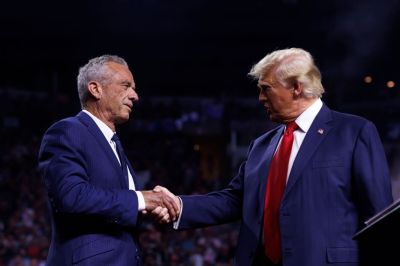If there’s a word for the guy with the hook who yanks vaudeville performers off the stage after they’ve overstayed their welcome, I’m the premature version of that. Too eager. When Barack Obama wrested the Democratic nomination from Hillary Rodham Clinton in 2008, I wrote that I was grateful at least that we wouldn’t have to write about the Clintons anymore. Now, I worry they’ll try to run Chelsea next time around. When Donald Trump announced his 2016 campaign, I wrote a piece headlined “Witless Ape Rides Escalator,” and when he was dragged out of office in 2021, I capped off—or so I thought!—my Trump commentary with “Witless Ape Rides Helicopter.” But like whatever iteration of the “Donkey Kong” franchise we’re on now, some simian specimens from the 1980s don’t know when to go extinct. I’ll probably end my professional days writing about the ghastly little spawn he named after the imaginary friend he invented to lie to the New York Post about his sex life.
But the one that might hurt the most: I really thought we were done with the Kennedys.
But, no. The Kennedys, like the Annenbergs—another family of jumped-up gangsters who spent the 20th century playing aristocrats—have become fully institutionalized, with Trump having selected nanny-molesting junkie criminal weirdo Robert F. Kennedy Jr.—that great bolus of messianic pretension expelled by Millbrook into the world of dopey left-wing activism—to head up the Department of Health and Human Services. He’s a cretin in every way that matters.
At least he has a famous name.
Pro-lifers who sold their souls to get Trump into the White House have been rewarded with an HHS nominee who is, among other things, an abortion zealot, having affirmed as recently as May that he opposes any regulation of abortion no matter how late into the pregnancy, “even if it’s full term.” He lately and suddenly insists that he is in favor of the “emerging consensus” on abortion, i.e., he has affirmed that he will say whatever it is politically necessary to say about the issue. When it comes to one of the most important policy questions that intersects with the health care industry, Trump’s HHS nominee apparently has reached the age of 70 without having quite figured out what he really thinks about it.
At least he has a famous name.
One might easily understand why Kennedy might want to keep open the means to eliminate, via surgery or poison, an unintended pregnancy. According to the adultery journal he kept—because what kind of mentally normal man doesn’t keep such a diary?—he managed to maintain affairs with 37 different mistresses in one year. That’s not quite Uncle Jack’s “girl-a-day routine” (as reported by Gore Vidal) but it apparently was enough—along with his relentless campaign of cruelty and humiliation—to drive one of his three wives to such despair that she killed herself.
At least she had a famous name.
Of course, death and despair and dysfunction attends the Kennedys—they have been producing those in considerable quantities for a century now.
What an “aristocracy” we have. Donald Trump is the grandson of a tax-dodging immigrant who made his fortune dealing in whores and horse meat in the Yukon and the son of a racist slumlord from Queens. Joseph Kennedy might not (your judgment will depend on how much weight you give to the accounts of mafiosi such as Frank Costello) have been the bootlegger of lore, but he did use his political connections to corruptly set himself up in the post-Prohibition trade, a business he later sold to mobster Longy Zwillman. And so it goes: RFK and JFK conducting their affairs with the same actress—apparently on the same night, on at least one occasion. Trump conducting his affairs publicly in the pages of the New York tabloid press. RFK Jr.’s second wife swinging out there in the horse barn, discovered with her fingers inside the noose—she apparently had second thoughts but was unable to save herself. Children dying of preventable measles cases in Samoa as RFK Jr. crusaded against the vaccines that could have saved many lives, suggesting that the vaccines themselves were the problem.
At least he has a famous name.
RFK Jr. also says he doesn’t think his father was killed by Sirhan Sirhan, who pretty obviously killed Robert F. Kennedy—we have Sirhan Sirhan’s word on that, among other evidence, including all the people who saw him kill Robert F. Kennedy—hell, George Plimpton was there trying to wrestle the gun out of the assassin’s hands. But these worthy American aristocrats can get funny about who killed whom. You’ll remember that the grandson of the horse-butchering Yukon snowbilly pimp once suggested that the son of the mobbed-up probably-not-a-bootlegger liquor baron was assassinated as part of a plot that involved the father of the Texas senator who was then one of the GOP primary rivals of the horse-butchering Yukon snowbilly pimp’s grandson. Sen. Ted Cruz swallowed his pride and has never stopped swallowing.
And what is Sen. Cruz going to do when ordered to vote for the philandering crackpot junkie felon by the coup-plotting grandson of the horse-butchering Yukon snowbilly pimp? Sen. Cruz is going to do whatever he is told. The distance from “great lunch” to “yes” on confirmation is considerably less than the distance the esteemed senator from Texas already has traveled.
Donald Trump dreams of creating a dynasty, a kind of ersatz royal family. After meeting with Queen Elizabeth II and imposing his ghastly children on the U.S.-U.K. “special relationship,” Trump proposed a “next generation” summit between his children and the fashionable young British princes. Someone might have asked: “Next generation of what?” Not that the would-be American royals and the British royals don’t deserve each other—Meghan Markle should be an honorary Trump, no?—but the neediness was unseemly in a man who is supposed to hail, after all, from a republic.
But all those famous names!
I’m not much of a class-war guy—I am, in fact, a hierarchy-positive guy. I believe in class and class distinctions as good and necessary. But the American ruling class can bring out my inner Lytton Strachey, at least as portrayed by Jonathan Pryce in Carrington: “God damn, confound, blast, and f--k the upper classes.” Kennedys, Trumps, Clintons, the lot of them—it’s a pity we don’t have recourse to exile as a means of political hygiene.
And Furthermore ...
There are a few good people in American public life with famous family names—Margaret Hoover and Barry Goldwater Jr. and Ross Perot Jr. and people like that—who do good work, often quietly. Some of them do their work so quietly that they’d be embarrassed to be praised for it in a public forum. You know who you are.
That stipulated, it is not easy to make a very good positive case for American political dynasties or American pseudo-aristocratic dynasties. The Kennedys are the same ridiculous grotesques they always have been. The Clintons—there isn’t enough penicillin in the world. The Obama daughters so far seem content to disport themselves in Aspen or wherever and sometimes to pretend to do work. Hollywood is full of people who were born into the business—Angelina Jolie, Gwyneth Paltrow, Jack Quaid, etc.—but there aren’t a lot of entertainment dynasties that make it into third and fourth generations with any real vigor.
In politics? Well. The Adamses both had tough times in their presidencies and, while they were able, intelligent, prudent men from whom contemporary American pols, especially conservatives, could learn a thing or two, they were more or less played out by the time Henry came into his own.
I’ll give you the Bushes—they’re the best-case scenario: Irrespective of whether you agreed with his policy views or priorities, George H.W. Bush was one of the most able public men of his generation and arguably the best-prepared president of the modern era; Jeb Bush played an enormously consequential role in Florida’s success story and was one of the most successful governors of his time; George W. Bush was a capable and patriotic man about whom the worst that could be said—and please do not mistake me for writing that this is a minor criticism—is that he suffered from an excess of democratic idealism in foreign policy. George P. Bush has … not done a great deal of damage to the republic, so far. The Bush twins seem pleasant enough, though I have never watched Today with Hoda and Jenna. Prescott Bush was an Eisenhower man, and I’ll forgive him his role in creating the Interstate Highway System. I like and admire the Bushes, but I don’t think having the last name “Bush” would necessarily incline me toward a politician. But, of course, the name “Bush” is not very much welcome in Republican circles right now and it is hard to see them as Democrats (even if Barbara Pierce Bush was a Kamala Harris supporter), so that probably won’t come up for a while.
But, as I noted in the opening: I’ve been wrong about this sort of thing before.
Words About Words
About coordinating conjunctions and commas last week, a reader points out that “because” is a subordinating conjunction, and so one of my examples was erroneous. The reader is, of course, correct. There are seven coordinating conjunctions and a handy mnemonic device for remembering them: FANBOYS: for, and, nor, but, or, yet, so.
There are lots more subordinating conjunctions, including, but not limited to: after, although, as, as if, as long as, as though, because, before, even if, even though, if, if only, in order that, now that, once, provided, rather than, since, so that, that, though, without, unless, until, when, whenever, where, whereas, wherever, whether, while, within, besides.
Coordinating conjunctions connect things of equal grammatical weight from nouns (Jack and Jill) to adverbs (slowly but surely) to independent clauses, as in last week’s discussion. Subordinating conjunctions establish relationships, hierarchy, cause and effect, etc. “I washed the dishes after we finished Thanksgiving dinner.” In addition to the conjunction issue, that sentence also is of interest because it represents a genre increasingly prominent in our public life: It is a lie.
In Other Wordiness …
Trump’s Cabinet: Many Ideologies Behind the Veil of ‘America First’
One faction of President-elect Trump’s prospective nominees seems focused on revenge, another on calming markets and a third on cutting people and budgets.
I have no doubt that Trump has a guy whose big enthusiasm is “cutting people,” but, unless the administration has hired Jack the Ripper, what the Times probably meant is “cutting payrolls” or “cutting positions.”
Also: It’s “You’ve got another think coming,” not “You’ve got another thing coming.” As in: “If you think you can get away with that nonsense, you’ve got another think coming.”
Economics for English Majors
If you want to understand why “shield laws” for journalists are a nice-sounding terrible idea, you need to think for a minute about the “ketchup as a vegetable” controversy of the Reagan years, which had nothing—seriously, not one word in the law—to do with ketchup.
The federal government has been in the school lunch business since 1946, and that sounds great to a certain kind of good-hearted person: What on Earth should we spend money on if not feeding nutritious meals to hungry children who cannot afford them? Except, of course, the National School Lunch Program (NSLP) had very little to do with relieving the supposedly Dickensian conditions of American schoolchildren in the Truman years (though of course we had a lot more real poverty in the 1940s than we do now) and a lot to do with providing yet another subsidy for one of the most powerful branches of (cue spooky music) Big Business: farmers. Wall Street has nothing on Big Elmer, and the school lunch program was designed to consume “surplus” commodities in order to keep them out of the marketplace, i.e., it was what is known as a “price support.” At the risk of sounding RFK Jr.-ish: Another way of saying that is that the government spent, and spends, a metric buttload of money—literal tons of money, if you took it in cash and stacked it on pallets—to “protect” Americans from that most nefarious of all shadowy forces: low prices at the grocery store. That’s American-style humanitarianism in brief: tax poor people to pay for a program that makes their food more expensive and then denounce anybody who complains as a child-hating, pauper-kicking misanthrope.
The NSLP grew and mutated over the years, of course, as such programs are wont to do, and while there was still federally organized commodity-dumping on a massive scale (my mother was known to buy “government cheese” from those who received blocks of the stuff under the old food-support program; selling those commodities was a big business not unlike the Appalachian trade in food-stamp Pepsi, i.e., hillbilly wampum), by the time of the “ketchup as a vegetable” controversy, the main questions were the size of the subsidy paid to local school districts for each meal served and what kind of meals were eligible for the subsidy. The rule in the early 1980s had specified that there had to be two vegetables served as part of the meal—but what counts as a vegetable? How processed can a vegetable be and still be a vegetable? A tomato sliced up and put on top of a salad counted as a vegetable, but what about a tomato simmered down into tomato paste and put on a pizza? Local schools wanted more flexibility about the kind of meals they served, and the original proposal from the Reagan administration would have let them count certain condiments and such (pickle relish, not ketchup, was the actual hypothetical example) as a vegetable, provided (this part was always left out of the hysterical discussions that followed) that there was another serving of a different vegetable of such a size as to plausibly make up the difference. The idea was to make more school lunches available for federal subsidies, but, as you can imagine, the storyline was, approximately, “Evil greedy Republican skinflints want to take away your children’s spinach and give them ketchup.” Of course, tomatoes already were eligible for the commodity program when processed into tomato paste and similar products, so they were available to schools at basically no cost.
Is pizza sauce a vegetable? It’s a trickier question than you might think. A lot of pizza sauce recipes are made of nothing but vegetables—tomatoes, peppers, onions, garlic, oregano, etc.—but calling the result a “vegetable” doesn’t seem exactly right. Sugar is a 100 percent vegetable product. So is high-fructose corn syrup. But when you tell your children to eat their vegetables, you aren’t thinking of a big bowl of sugar topped with HFCS. You could say “Just use common sense!” if you were fool enough to think that would lead to anything commonsensical.
What you really need to keep in mind is that the big driver behind the school lunch program wasn’t children’s nutritional needs—it was farmers’ economic interests.
Which brings me, via the usual scenic route, to my subject: shield laws for journalists.
Congress currently is considering a bill, the PRESS Act (that’s “Protect Reporters from Exploitative State Spying Act,” and here I will reiterate my position that people who come up with cutesy acronyms for such legislation should be impeached, pilloried, and permanently disenfranchised), which is a “shield law” for journalists, one that would liberate them from the obligation to comply with certain subpoenas. Under the law, the feds:
may not compel a covered journalist to disclose protected information, unless a court in the judicial district in which the subpoena or other compulsory process is, or will be, issued determines by a preponderance of the evidence, after providing notice and an opportunity to be heard to the covered journalist disclosure of the protected information is necessary to prevent, or to identify any perpetrator of, an act of terrorism against the United States; or disclosure of the protected information is necessary to prevent a threat of imminent violence, significant bodily harm, or death, including specified offenses against a minor.
The two words that most matter in all that legal language are “covered journalist.”
Who dat? The law reads:
The term “covered journalist” means a person who regularly gathers, prepares, collects, photographs, records, writes, edits, reports, investigates, or publishes news or information that concerns local, national, or international events or other matters of public interest for dissemination to the public.
The problem with that language is that every jackass who is out there “doing my own research” is someone who “investigates information that concerns matters of public interest,” and everybody who republishes his junk on Facebook “publishes news.” If everybody is a journalist—and, under that definition, pretty much everybody is a journalist, or could immediately become one, even illiterates—then the category “journalist” means nothing and neither do a whole lot of subpoenas. Is a blogger a journalist? I’m sure Ezra Klein thought so back when Wonkblog was his one-man show rather than a Washington Post feature. Is a guy who posts links on a website, maybe with a little commentary, a journalist? Matt Drudge probably was the most important journalist of the Clinton era, and that was what he mostly did. But as William F. Buckley Jr. used to say—and as Jonah Goldberg often quotes him saying, “Expressio unius est exclusio alterius,”or, To include is to exclude. A definition of “covered journalist” that is workable as a matter of law would have to exclude a lot of people.
Which is to say: Shield laws are a backdoor means of licensing journalists. Even if the government isn’t issuing ID cards that say “USDA-Certified Grade-A Organic Journalist” on them, giving a special set of legal protections to a group of people based on their trade is licensure. And there would be legal peril in practicing unlicensed journalism.
In our upside-down times, there are a lot of small-time citizen activist types who are out there doing real journalism, while a lot of people working in high-profile journalism jobs—Paul Krugman of the New York Times, for example—do not really do journalism at all. Fox News is 99.44 percent sewage-grade Republican propaganda (on a good day!), but how are you going to write a shield law that excludes the most popular cable news outlet in the country or a good third of the columnists at our most important newspaper?
Whatever decision gets made, it is going to get made by the ketchup-as-a-vegetable guys, and it is going to get made in the same self-interested, self-serving way.
We have a good legal system in this country. We have excellent courts, excellent procedure, etc. It is a good enough legal system for journalists, who do not need any special privileges to do their job—and who surely would be gently but profoundly corrupted by the pursuit and maintenance of such privileges, should they be offered.
And if you’re thinking this wasn’t really an economics issue, you’ve got another think coming.
A lot of people will be tempted to support the shield law only because Donald Trump bitterly opposes it. Trump is, of course, too ignorant to understand that the law would actually give him a very useful tool for punishing journalists he doesn’t like, even as it probably would not do a lot of good for its supposed beneficiaries.
Elsewhere ...
You can buy my most recent book, Big White Ghetto, here.
You can buy my other books here.
You can see my New York Post columns here.
Please subscribe to The Dispatch if you haven’t.
You can check out “How the World Works,” a series of interviews on work I’m doing for the Competitive Enterprise Institute, here. My most recent guest is Father Dominic Legge of the Thomistic Institute in Washington, D.C.
In Conclusion
If you think my assessment of Robert F. Kennedy Jr. is harsh, consider all the stuff I left out. It isn’t that I don’t sympathize with recovering addicts and people who have had horrible trauma in their lives—I do—but the fact is that it is entirely possible for people with sad back stories to still be arrogant, destructive, self-righteous, dangerous fools. And the Kennedys are a pack of them.







Please note that we at The Dispatch hold ourselves, our work, and our commenters to a higher standard than other places on the internet. We welcome comments that foster genuine debate or discussion—including comments critical of us or our work—but responses that include ad hominem attacks on fellow Dispatch members or are intended to stoke fear and anger may be moderated.
With your membership, you only have the ability to comment on The Morning Dispatch articles. Consider upgrading to join the conversation everywhere.